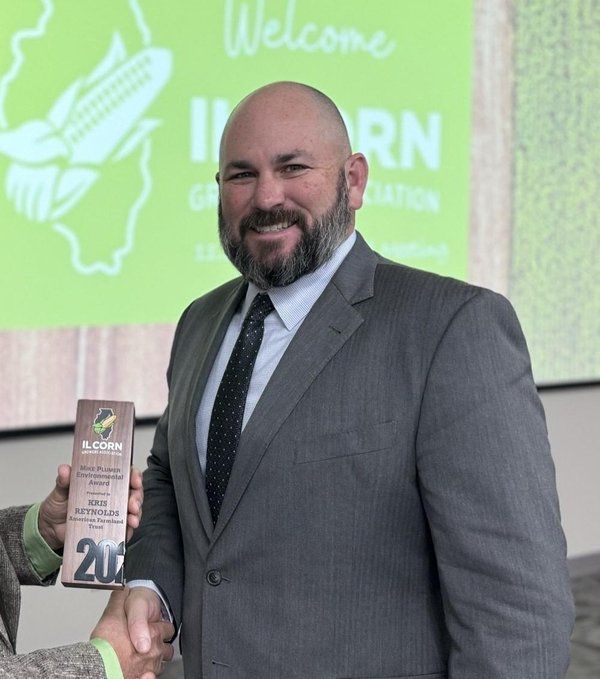Reynolds Receives 2024 Mike Plumer Environmental Award

Bloomington, IL – Kris Reynolds, Midwest Director for American Farmland Trust, is the 2024 recipient of the Mike Plumer Environmental Award, named for a University of Illinois Extension Educator and no-till pioneer who died in 2017. Reynolds received the award from the IL Corn Growers Association at their annual meeting on November 26.
Since 2017, Reynolds has managed Midwest programs that promote sound farming practices, help keep farmers on the land and protect farmland at American Farmland Trust. Among the sound farming practices are activities that improve water quality, soil health, enhance nutrient efficiency, utilize conservation cropping systems, and combat climate change.
“Reynolds has been an advocate for all of the same conservation management practices that we encourage and has facilitated Illinois corn farmers to learn, grow, and adopt practices that will increase soil health, protect clean water, and overall make us better stewards of our natural resources,” said Dave Rylander, President of ICGA and Victoria, IL farmer.
As an example of his work, Illinois can thank Reynolds for bringing the Fall Covers for Spring Savings to our state and working to fund it annually. He coordinates with stakeholders to keep the program in the budget and increases funding and acre availability yearly. This popular program runs out of available acres each year within hours of opening availability to participate. What began in 2020 as a 50,000-acre target is now expanded to 190,000 acres in 2025 thanks in part to Reynold’s support.
Reynolds has a career full of this transformative work, first as a cover crop specialist with the Illinois Council on Best Management Practices and later as a Resource Conservationist with the Montgomery County Soil and Water Conservation District. He is also a fifth-generation corn and soybean farmer in Nokomis, IL who began a soil health journey on his own family farm in 2013 by incorporating cover crops, no-till, and nutrient management practices.
Reynolds is a Certified Crop Advisor with the American Society of Agronomy and holds a specialty certification as a 4R Nutrient Management Specialist and Sustainability Specialist. Reynolds holds a B.S. in Agronomy and Ag Business from Illinois State University.
###
About the IL Corn Growers Association
IL Corn Growers Association is a state-based organization that represents the interests of corn farmers in Illinois, maintaining a high profile on issues in Washington, DC, and Springfield, IL. Through grassroots advocacy, ICGA creates a future for Illinois farmers in which they can operate freely, responsibly, and successfully. In order to fulfill this mission, the organization conducts governmental affairs activities at all levels, market development projects, and educational and member service programs. For further information regarding their work and involvement, visit their website www.ilcorn.org.







